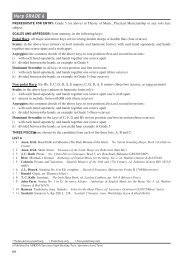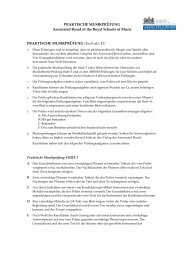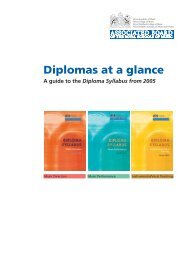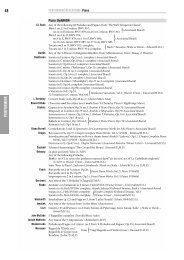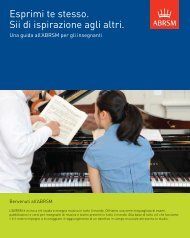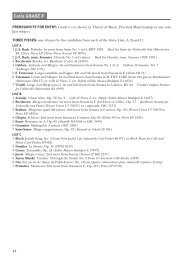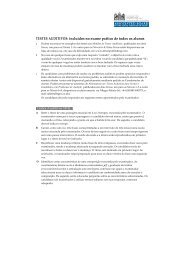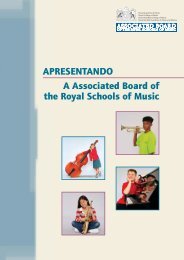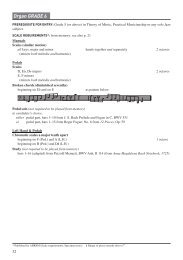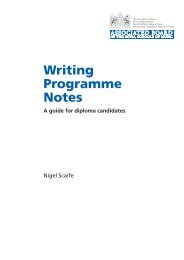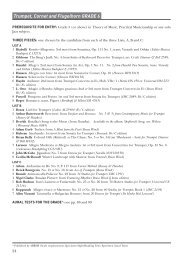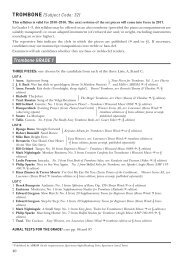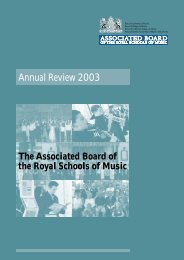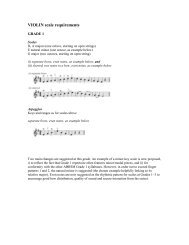LIBRETTO - ABRSM
LIBRETTO - ABRSM
LIBRETTO - ABRSM
You also want an ePaper? Increase the reach of your titles
YUMPU automatically turns print PDFs into web optimized ePapers that Google loves.
16<br />
FORUM<br />
Timing<br />
Your chance to share experiences and ideas with other readers.<br />
In each issue our Chief Examiner, Clara Taylor, introduces a subject<br />
for discussion. We then publish your responses in the next issue.<br />
Your contribution may be edited for publication.<br />
Write to Clara Taylor, marking your envelope Forum, or<br />
email chiefexaminer@abrsm.ac.uk<br />
Next topic: helping the slow starters<br />
Clara Taylor<br />
A unique bond<br />
Getting the timing right for<br />
exams is a skill in itself! The<br />
unique bond between teacher<br />
and pupil is an invaluable aid in<br />
making decisions with and on<br />
behalf of the student. It provides<br />
a real insight into their strengths<br />
and weaknesses and the longer I<br />
have taught somebody, the easier<br />
I find it to help them make the<br />
right musical decisions.<br />
However, there is always a<br />
chance of a last-minute crisis –<br />
family problems, a headache, an<br />
argument with a friend, a broken<br />
instrument or sheer panic on the<br />
day of an exam. We cannot prepare<br />
for this but it is possible to draw<br />
on the close relationship with the<br />
student to provide reassurance, to<br />
boost confidence or give a sense<br />
of perspective. Even in the event<br />
of a disappointing result it is<br />
possible, with carefully chosen<br />
words, to console and rekindle<br />
enthusiasm in a student who has<br />
grown to trust, respect and even<br />
like their teacher.<br />
We can all get it wrong<br />
sometimes, but the bond I have<br />
with my students is one of my<br />
most valuable teaching aids as<br />
well as being one of the great<br />
rewards of the job.<br />
Alison Wilkins<br />
Reading, UK<br />
Very occasionally teachers may have to<br />
cope with a pupil who has no interest in<br />
playing, no aptitude, no intention of<br />
practising and just waits with barely<br />
concealed impatience for the end of the<br />
lesson. This situation is, fortunately, rare<br />
but I would have no hesitation in telling<br />
the parents that they are wasting their<br />
money and that lessons should cease<br />
immediately, to the relief of all concerned.<br />
What about, however, those who are<br />
not blessed with a strong sense of rhythm<br />
or pitch, are poorly co-ordinated and slow<br />
to learn but enjoy the lessons, do the best<br />
they can at home and keep coming back<br />
for more? Although such pupils may stretch<br />
their teacher’s patience to the limit, I<br />
believe that they are very worthwhile to<br />
teach. A genuine response to the music<br />
and progress, however slow, gives the<br />
teacher an opportunity to take things at<br />
the pupil’s pace, relax the relentless series<br />
of goals that are the usual routine<br />
Lessons in timing<br />
Recently one of my students<br />
surprised me by announcing that<br />
she wanted to participate in the<br />
next exams. I was hesitant as this<br />
student is not very confident, is a<br />
perfectionist, works slowly and<br />
would need to work extra hard to<br />
prepare in time. However, she<br />
was enthusiastic and convinced<br />
that she could do it. My evaluation<br />
was that she might not be entirely<br />
successful but that her spirit<br />
would be dampened if I talked her<br />
out of it. After discussing the issues<br />
with the student and her parents,<br />
we mapped out a course that I felt<br />
would prepare her in time. She<br />
worked faithfully but the pressure<br />
affected her self-confidence. On<br />
the exam day we both felt hopeful<br />
but not confident. Imagine my<br />
horror when she emerged from the<br />
exam room in tears! Our initial<br />
conversation consisted of her sobs<br />
and claims that she had ‘messed<br />
up’. Later, we carefully reviewed<br />
the exam and ascertained that<br />
there had only been a few minor<br />
mistakes but that her feeling of not<br />
having enough time to prepare<br />
had affected her confidence and<br />
her performance negatively.<br />
When she received her marks –<br />
a respectable 125! - she felt much<br />
better but still said that if she had<br />
been less nervous she would have<br />
Special Visits<br />
and really foster a love of music on the<br />
pupil’s own terms.<br />
Frank discussion with the parents is<br />
essential as expectations need to be<br />
realistic. Exams may be on the agenda but<br />
it will take longer to reach each grade and<br />
a natural ceiling may occur around Grade 4<br />
or 5. Never mind, the pupil will be playing<br />
enough to have the all-important first<br />
hand contact with music and all the<br />
benefits that brings. An exam result of 102<br />
should be a genuine cause for celebration<br />
and congratulations. It may well be more<br />
of a triumph for the less gifted pupil than a<br />
mark of 132 for one who races easily<br />
through the grades. Incidentally, the<br />
current average mark for Grades 1 to 8<br />
Practical is 117, a piece of information<br />
which may be useful to parents whose hopes<br />
for their offspring may be over-optimistic.<br />
Do write to us with your experiences of<br />
this situation. Shared views and approaches<br />
to teaching are so valuable to us all.<br />
done better. On a positive note, she<br />
now realises that she needs to feel<br />
very well prepared for an exam and<br />
needs to give herself enough time<br />
to reach that situation. We may<br />
have made the wrong decision on<br />
the timing of this exam but she<br />
learned something very valuable<br />
for the future. In fact, she recently<br />
played in a piano festival, using the<br />
same pieces (now very familiar and<br />
beloved) and was awarded a Gold<br />
Seal Certificate. Perfect timing!<br />
Judith Walter<br />
New Jersey, USA<br />
I would like to add a note in<br />
support of the Associated Board’s<br />
system of Special Visits which I have<br />
used extensively since it began.<br />
The opportunity to arrange a<br />
suitable date away from the<br />
inevitable pressures of the end of<br />
the school term is of enormous<br />
benefit to candidate and teacher.<br />
Preparation can be paced with<br />
more certainty and the inevitable<br />
extra practising can be incorporated<br />
in the candidate’s daily routine<br />
with greater ease. Add to this the<br />
advantage of a familiar piano and<br />
location and the benefits of the<br />
system seem unbeatable.<br />
Vivien Laird<br />
Ely, UK<br />
write now ■ ■ ■ write now ■ ■ ■ write now ■ ■ ■ write now ■ ■ ■ write now ■ ■ ■ write now ■ ■ ■ write now



